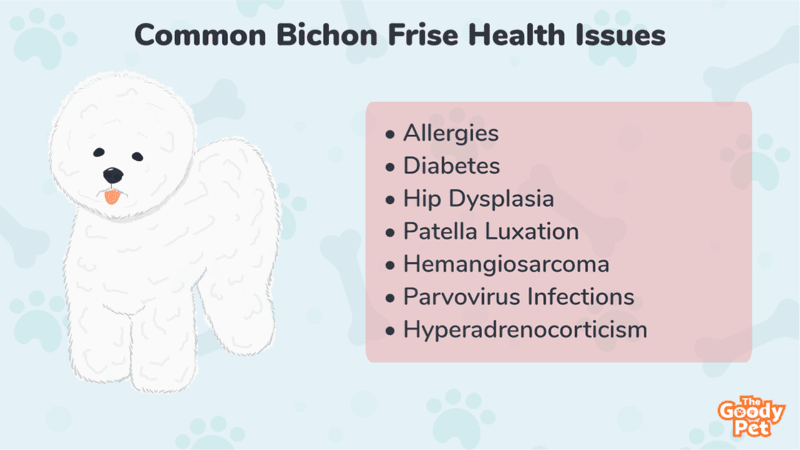Bichon Frises are relatively low maintenance dogs. This makes them incredibly fun to have around the house as family pets. I have thought about having one myself and I was particularly interested in their health problems as small breed dogs.
Here is what I found out from my research on the dog.
What are some common health issues that a Bichon Frise have? Bichon Frise dogs suffer from a variety of health issues. Some are life-threatening while others simply affect the quality of life the dog gets to enjoy. Some of the most common in both cases include:
- Hemangiosarcoma (Cancer And Tumor)
- Hip Dysplasia (Joints)
- Allergies
- Patellar Luxation
- Diabetes
- Hyperadrenocorticism (Hormonal Imbalance)
- Parvovirus Infections (Digestive System)
For the most part, these dogs are not very sickly. However, there are some conditions that you will have to look out for and deal with as a dog owner. Understanding these diseases in terms of what they are, how they present and their outcomes is the best way to ensure that you have the best dog owner experience with the Bichon while improving your pooch’s quality of life.
Let us take a look at some of these health problems so that you have an idea of what to expect and how you can play your part in promoting good health for your furry best friend.
Common Bichon Frise Joints And Old Age Problems
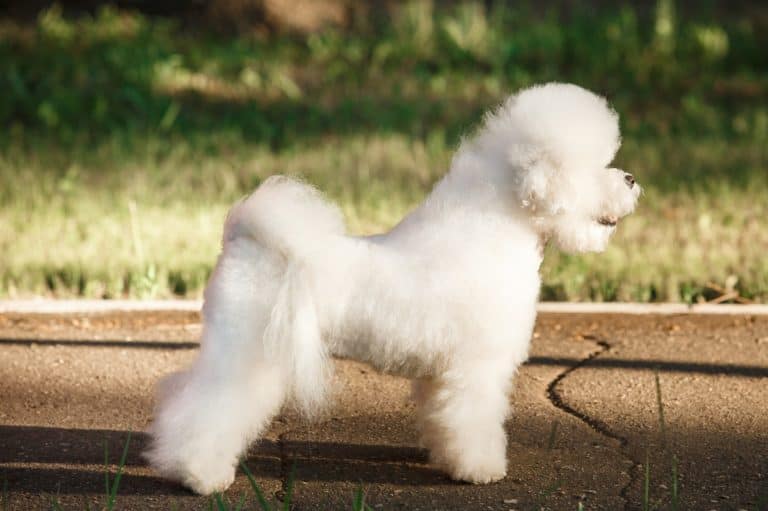
The Bichon Frise, as a small breed dog, inevitably suffers several joint and bone problems. This is more often than not as a result of a combination of their small build and inadequacy in the diet of nutrients and compounds useful in musculoskeletal health. These conditions only worsen with age and it is thus crucial that they are picked out and dealt with as early as possible.
Patellar luxation is one of the most common of these problems. It basically refers to loosening of the knee bone which in turn leads to instability of the legs. It is an age-related problem associated with deterioration of the strength and structural integrity of the ligaments that hold the patella in place in its joint.
Hip dysplasia is another frequently occurring one that usually afflicts the fluffy, white, little angels. It is a genetically acquired condition, but environmental factors like diet and exercise could affect whether or not it is present in your bichon. The disease itself causes abnormal formation of the hip joint which leads to issues with mobility as well as severe arthritis if not dealt with.
You may also encounter the Legg-Perthes disease which is common not only in the Bichon Frise breed but most small dog breeds. This is a condition where there is interrupted blood flow to the head of the femur. As a result, necrosis occurs therefore tampering with the overall integrity and functionality of the joint.
Finally, Bichons have a lot of joint and bone problems related to trauma. They have a very carefree and playful temperament which often gets them into trouble.
Do Bichon Frise Have Breathing Problems? How About Bichon Frise Stomach Problems?
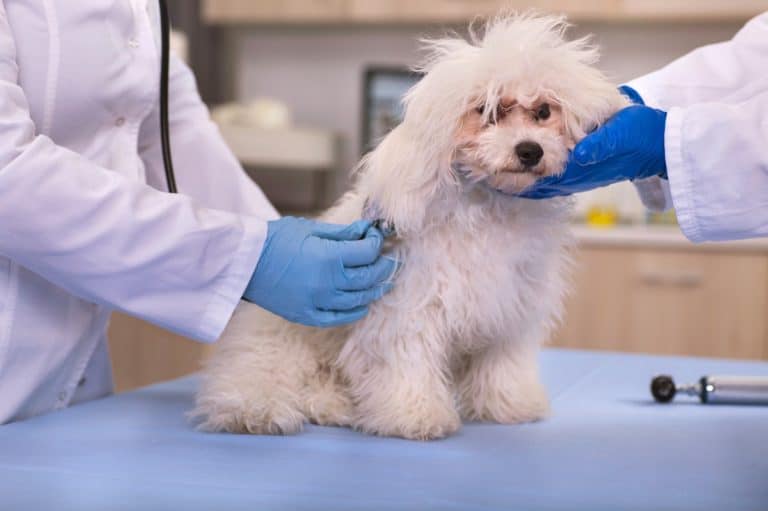
Bichon Frises may be generally healthy but this does not mean that they do not have a number of health issues to deal with. The respiratory system and the digestive system are among the worst hit by a variety of issues.
When you are considering to purchase a Bichon Frise, do take into consideration the cost of these possible diseases. However, it is good to know that Bichon Frise are generally healthy dogs, unless you got it from unscrupulous breeders or from a rescue.
These common issues among Bichons include:
Respiratory diseases
Allergies
It is slightly ironic that one of the most hypoallergenic breeds suffers from several allergies of its own. Bichons have a number of respiratory allergies including reactions to dust, pollen, mites, fabric, and even chemical fumes. These will cause symptoms like sneezing and a runny nose.
Lung Cancer
Lung cancer is one of the most prolific malignancies in Bichons. It is a disease of old age and is often fatal if it gets to metastasize.
Pneumonia
This also occurs mainly in older Bichons whose immunity is lower but may also occur at any age as a consequence of kennel cough in cases of overcrowding. It causes coughing and difficulties in breathing and should be handled by a vet as soon as these symptoms are identified.
Digestive Diseases
Parvovirus
This is a common viral infection of the gut. It affects Bichons a lot due to their little hobby of foraging for food in the garbage. The infection causes diarrhea and abdominal discomfort in addition to several other issues.
Food Intolerance
Digestive problems in these dogs could also be as a result of food intolerances. Some of the foods on this breed’s no-no list include caffeine and citrus oil. You should also avoid others in general lists of what you shouldn’t feed dogs including grapes, chocolate and undercooked chicken.
Hemangiosarcoma And The Common Bichon Frise Cancers
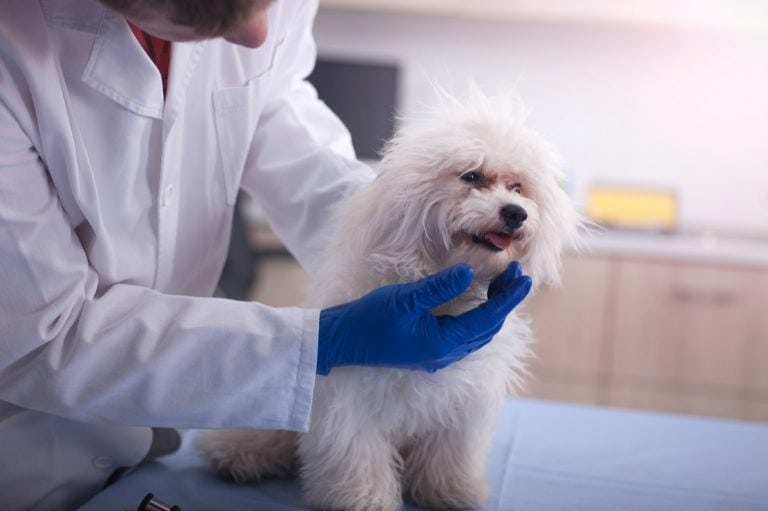
Cancer is one of the leading causes of death with the Bichon Frise breed. It occurs in different forms, at different ages and in different severity levels but most are fatal tumors that attack older Bichons.
Hemangiosarcoma is incredibly common with this breed and has a spot on one of the leading killers of Bichons. It is a cancer of the blood vessels and other solid tissues in the cardiovascular system. It occurs in highly vascularized organs like the spleen, liver, lungs and occasionally the heart. Due to this specific group of targets, it is easily metastasized and it is this uncontrolled spread that often results in death.
In addition to the hemangiomas, Bichons are also known to suffer from skin cancers. In fact, they are considered among the top 10 most commonly affected dog breeds by this malignancy. The cancers take different forms including Mast cell skin cancer and malignant melanoma. They also manifest in different ways like bumps and color changes which you will pick up on while grooming or petting your furry bestie.
Bichons also suffer tumors of the reproductive system with mammary glands, ovaries, and testicles being the most affected. Fortunately, it is one of the few groups of cancers in Bichons that may be definitively prevented through spaying.
The list of cancers that could afflict your little best buddy is endless. From lung cancer and blood cancers to digestive tract tumors, your best hope is early detection through regular vet visits. That way the problem can be dealt with before the cancer spreads and there is no hope for the Bichon.
Hyperadrenocorticism In Bichon Frise – Common Hormonal Disorders In Bichon Frise
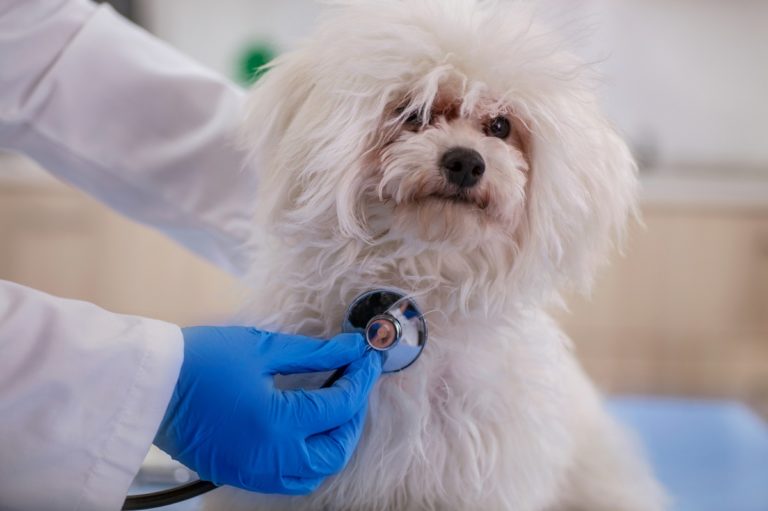
Hormonal disorders tend to occur a lot with Bichon Frises. What is most frustrating about them is the fact that they have very non-specific symptoms. It therefore takes time to pick up on them and have the dog treated. They also occur at any age which further complicates the process of narrowing down your options.
For the most part, Bichon Frises are affected by 2 main hormonal imbalances. The first is hyperadrenocorticism which is also known as Cushing’s disease. As the name suggests, this is an illness where there is an overproduction of adrenocortical hormones from adrenal glands. The hormones play different roles including regulating metabolism.
With Bichon’s in particular, there are links between the condition and long-term use of steroid-based allergy medication.
This disease presents with different signs and symptoms depending on the severity. These include:
- Alopecia (Hair Loss And Itchiness)
- Heat Intolerance
- Continuous Panting
- Lethargy
- Increased Thirst And Potty Breaks
- Muscle Weakness
The second common culprit when it comes to hormonal imbalances is Diabetes Mellitus. This is a disease of either low insulin production or high resistance to the hormone. It essentially prevents glucose in the bloodstream from entering the cells which leaves your body functioning in a state of relative starvation. It may be genetic, but for the most part it’s associated with unhealthy eating habits and inadequate exercise with the Bichon.
Some of the common signs and symptoms here include:
- Dehydration And Extreme Thirst
- Vomiting
- Weight Loss Or Obesity
- Cataracts
- Poor Healing Of Wounds
Bichon Frise Skin And Dental Problems
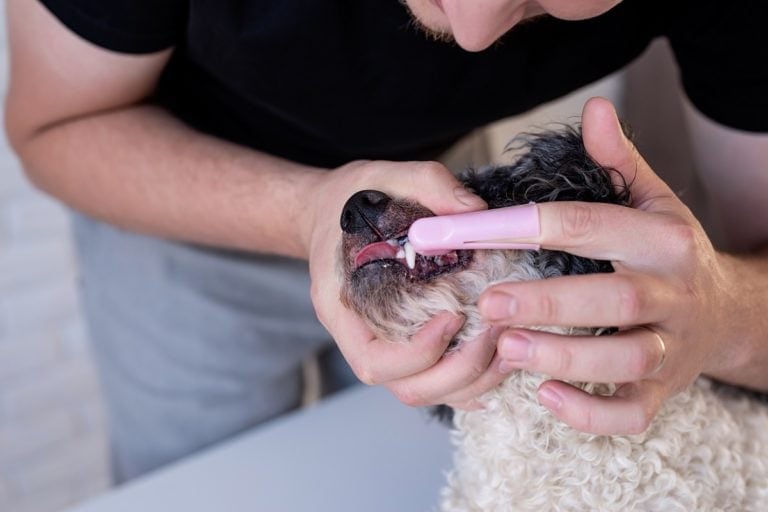
Bichon Frise dogs are popular for their aesthetics. And despite being low maintenance with their low shedding coats, they still suffer from different skin and dental illnesses. These include:
Skin Conditions In Bichons
Allergic Dermatitis
This is irritation of the skin as a result of exposure to allergens. Bichons are allergic to all sorts of things including fleas, ticks, fabrics, and chemicals. Contact with these could cause something as simple as mild itchiness or as serious as skin hives and bruising from excessive scratching.
Skin Cancer
This occurs mainly in older Bichons and has been associated with excessive exposure to sunlight. The outcome depends on the type of skin cancer and how far it has spread by the time it is discovered on the Bichon.
Dental Conditions In Bichons
Tartar
This happens when plaque builds up on the Bichon’s teeth and forms a darker and harder to remove layer on the surface. It is a trend with this breed as they are not prolific biters so if you do not provide a toy or hard chew treats they will not be able to clean their teeth.
Dental Cavities
Cavities are almost always a consequence of long term tartar buildup. This is common with these dogs as their teeth are small and have thin protective enamel linings which the tartar weakens with time.
Gingivitis
Gingivitis refers to the inflammation of gums. Bichons suffer from this as a result of poor oral hygiene. It could also be due to trauma while chewing on things like bones or hard inedible objects that their little weak teeth cannot properly handle.
Related Questions
Where Do Dogs Go After They Die? Whether they died from old age or a disease like hyperadrenocorticism, dealing with the remains of your pooch can be challenging. Your two main options are burial and cremation. The two may be arranged by dog shelters or veterinary offices. However, if you have your own land you could easily do it yourself.
How Do I Know My Dog Is Dying? With Bichons, the best indicator of oncoming mortality is old age. The closer they are to that 15-year point the lower the vitality and the higher their chances of just kicking it. You may also notice signs and symptoms of serious illnesses like cancers which tend to take them out really quickly.
What Is The Average Lifespan For A Bichon Frise? The Bichon Frise has a pretty long life span of between 12-15 years which is one of the longest life periods in the world of dogs. They often die of old age, trauma, or cancer and for usually leave very happy and healthy lives leading up to their inevitable end.

